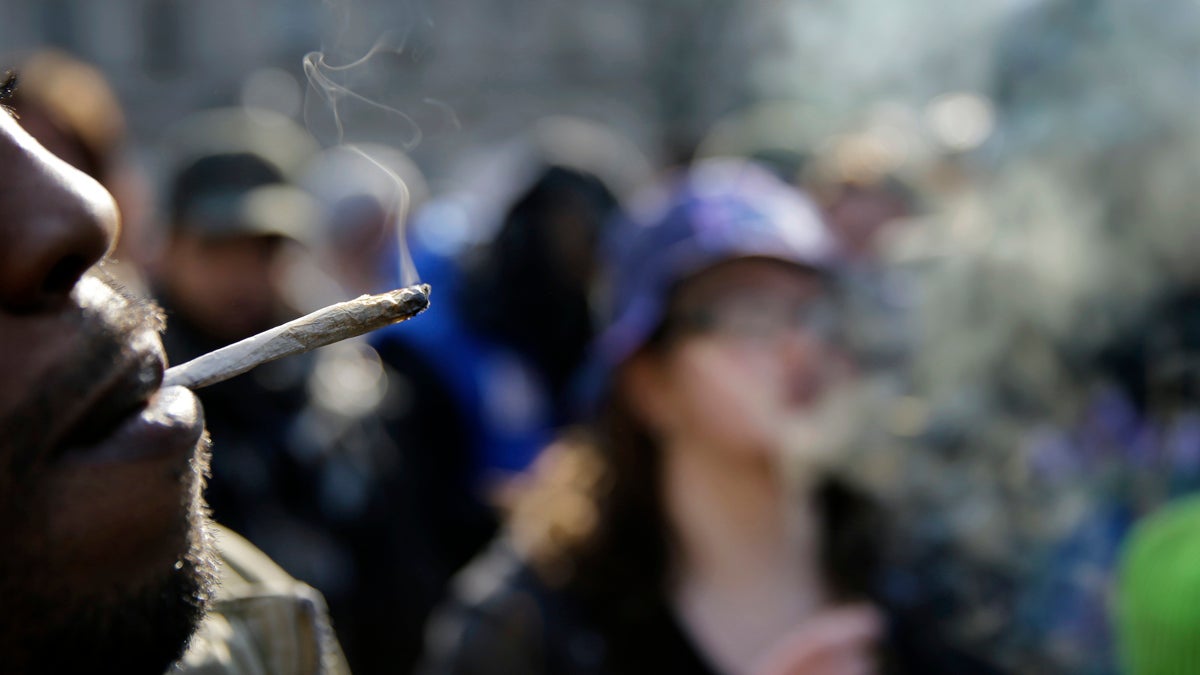Racial disparities persist in New Jersey marijuana arrests, report shows

People smoke marijuana cigarettes as a large group gathered near the New Jersey Statehouse to show their support for legalizing marijuana Saturday, March 21, 2015, in Trenton, N.J. (Mel Evans/AP Photo)
The Garden State has a weed problem, according to the state branch of the ACLU.
Blacks are three times more likely than whites to be arrested for marijuana possession in New Jersey, despite using the drug at roughly the same rates, according to a new report by the nonprofit.
The ACLU of New Jersey, which used data from 2013, also found that marijuana arrests in the state have reached an all-time high.
If you look at only one chart in our marijuana arrest report, it should be this one. The whole thing’s here: https://t.co/S6xEmMzT8d pic.twitter.com/tYLE0IMeZw
— ACLU of New Jersey (@ACLUNJ) June 15, 2017
The report released Thursday comes as a Democratic state Senator is proposing legislation to legalize marijuana, and the two leading gubernatorial candidates to replace Gov. Chris Christie next year have said they are open to easing the state’s drug laws.
“Marijuana enforcement hasn’t worked for New Jersey. It’s wasteful. And it destroys people’s lives,” said Dianna Houenou, policy council for the ACLU of New Jersey. “It’s time for us to legalize it.”
New Jersey spends more than $143 million per year to enforce marijuana laws, the report found, leading to arrests that can have lasting impacts on the lives of those who are caught. “You can face incarceration. You can face fines and fees over $1,000. You have a criminal record that makes it hard to get a job. You can be banned from public housing,” said Houenou.
Racial disparities in marijuana arrests, which are three times higher for blacks on average, can be worse in certain places across the state, too. A black person in East Hanover Township is 25 times more likely to be arrested for pot than a white counterpart. In Point Pleasant Beach, the town with the largest racial disparity, blacks are 31 times more likely to meet with law enforcement.
Dominick Bucci, a retired New Jersey state trooper who was quoted in the report, said that policing tactics from the “War on Drugs” have remained even as social attitudes toward drug use and addiction have softened.
“It’s been a failure,” said Bucci. “It’s been a failure for a very long time, but we keep doing the same things over and over again as far as enforcement is concerned.”
Despite presiding over the rollout of New Jersey’s medical marijuana program, Gov. Chris Christie has long opposed legalizing recreational marijuana, calling the idea “beyond stupidity.”
Any plan to legalize pot now would likely go up in smoke once it reached the governor’s desk, but with Christie’s term winding down, legalization could become a reality under the state’s next governor.
Democrat Phil Murphy, who is leading in recent polls, has vowed to legalize the drug. His opponent, Republican Kim Guadagno, does not support legalization but has said she would consider decriminalizing marijuana.
A bill introduced by state Sen. Nicholas Scutari, D-Union, to legalize small amounts of recreational marijuana for adults is scheduled for a hearing before the Judiciary Committee next week.
Although critics have denounced the legislation for both going too far and not going far enough, Scutari said his bill would produce positive changes right away across the state.
“It’s going to save a lot of lives. It’s going to save our street corners. It’s going to create a tremendous amount of economic opportunity and activity. It’s going to raise needed cash revenue. It’s going to take money off the black market,” said Scutari, in an interview.
“There’s so many different avenues New Jersey is going to benefit from by entering into a completely legal, legitimate, regulated industry.”
WHYY is your source for fact-based, in-depth journalism and information. As a nonprofit organization, we rely on financial support from readers like you. Please give today.




